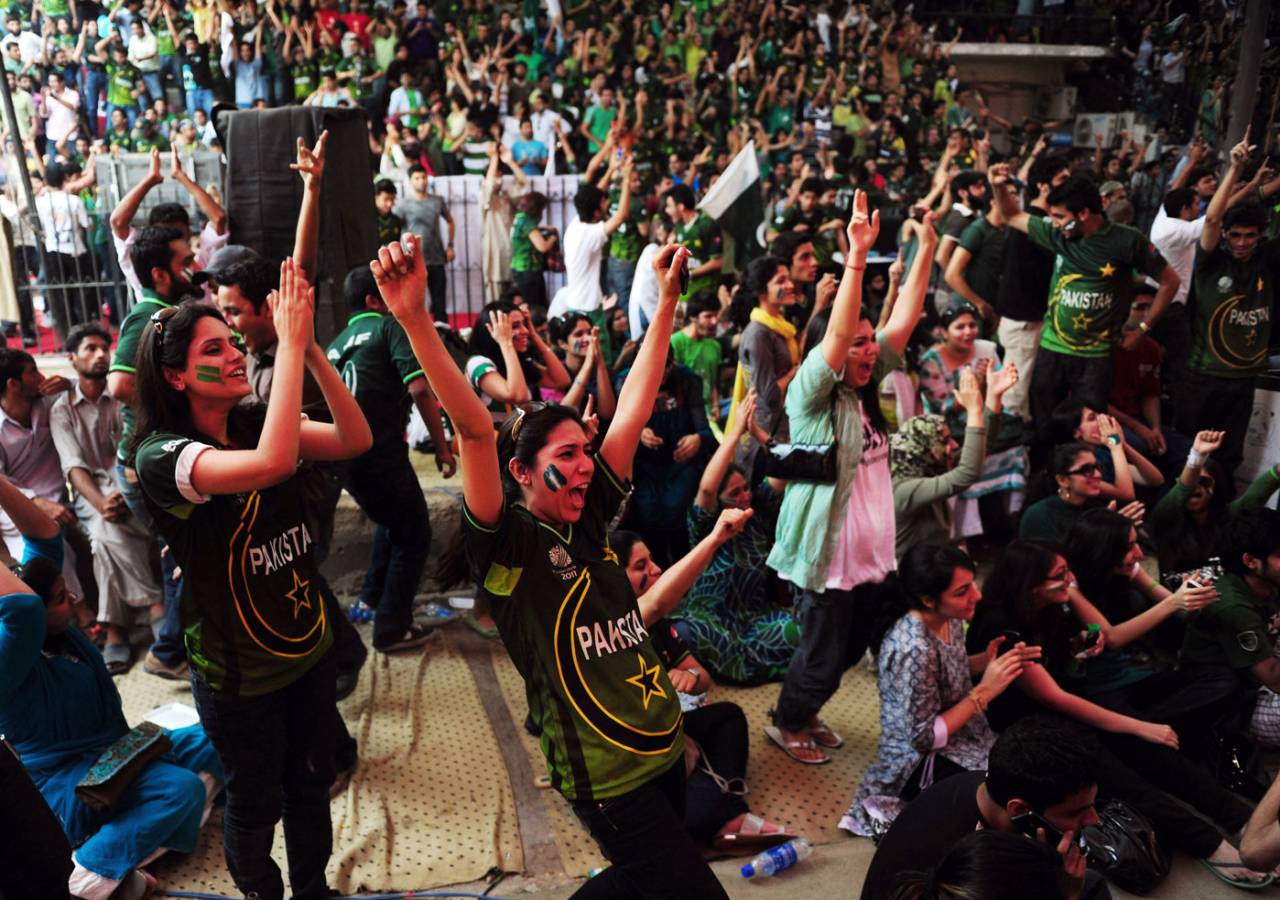Is supporting the opposition a crime?
Which sporting team you support is deeply personal, and tied in to your sense of identity
Janaka Malwatta
11-Mar-2014

To experience the contest at a visceral level you have to invest something of yourself in it • AFP
The complex interplay of allegiance, identity and nationalism has been highlighted by recent events in Meerut. Kashmiri Indian students at the Swami Vivekanand Subharti University incurred the ire of the Uttar Pradesh authorities by cheering when Pakistan defeated India in a recent Asia Cup match. For this gesture, they were charged with sedition - a serious crime, one step short of treason, introduced under British rule as a counter-measure to anti-colonial rebellion. The charges have been dropped but the students remain suspended. A heavy price to pay.
Sport can be regarded as an abstract expression of skill, athleticism and artistry, but at its heart it is a contest. Watching sport as a neutral observer, one might admire the technical prowess of the competitors, their determination, even be drawn in by the drama of a closely fought contest. But it is a semi-detached enjoyment, akin to the way one might appreciate a Holbein masterpiece or the Rubaiyats of Omar Khayyam. It is an intellectual pleasure.
To experience the contest at a visceral level, to savour the chest-thumping, heart-pumping, gut-constricting fears and triumphs, you have to invest something of yourself in it. As in life, the more you invest, the greater the risk, the greater the reward. You have to be prepared for the hurt of defeat to revel in the soaring joy of victory. You have to care.
An emotional investment is in itself a declaration of allegiance. Whether on the village green or the national stage, allying yourself with a team is an expression of personal identity. Norman Tebbit, a cabinet minister in Margaret Thatcher's Conservative government, understood this perfectly well. A sallow, cadaveric man, he was troubled that British residents of South Asian and Caribbean descent supported the countries of their heritage rather than the England cricket team. He mooted the "cricket test", widely known as the Tebbit Test, which - encapsulated in the question "Which side do your cheer for?" - posited that a British citizen who chose to support a foreign team against a British national team was not sufficiently invested in Britain. They might be perfectly law-abiding, tax-paying citizens, but their loyalty to Britain was open to question.
I lived in England for over 30 years. I could no more support England against Sri Lanka than I could breathe underwater. Love of Sri Lanka is ingrained in me, left there in childhood by the stories my father told me of our customs and traditions, our ancient civilisations, our luscious green hills, reinforced by a lifetime of interaction with the place and its peoples.
I'm not indifferent to England's success. I cheered when Steve Harmison induced Billy Bowden to raise a crooked finger, sending Michael Kasprowicz back to the pavilion and thereby giving England the Edgbaston Test of 2005 by the narrowest of margins. But it takes a moment of Sri Lankan triumph to make me leap from my seat and wave my fists like a man possessed. The reaction is inherent in me. It is not the product of a coldly reasoned decision to support one side or another; it is not born of intellectual appreciation of a moment of skill; it is raw, impassioned, visceral, and an undeniable expression of my identity.
I do know of immigrants who have taken that coldly reasoned decision to switch allegiance from the country of their birth to the country of their residence. South African friends here in Australia have decided that Australian residence and citizenship oblige them to support Australia. Some have successfully made the transition; for others, the resolution lasted until the first ball at the Gabba in 2012.
So did Tebbit have a point in arguing that support of a cricket team is a barometer of loyalty, and, more importantly, of successful integration into a host society? He didn't seem perturbed that Australians, whether they had lived in the UK for three months or for 30 years, supported the men wearing the baggy green. Australians, by and large, share a language, religion and, let's be frank, skin colour with their British hosts. Perhaps it is the sense of otherness that Tebbit seemed uncomfortable with.
Tebbit might argue that Australians, despite their predilection for backpacks, have never crammed those backpacks with explosives and detonated them on or under the streets of London. A similar argument has been made in the Indian press. Indians supporting Australia, it has been said, might be a puzzling irritant; Indians supporting Pakistan, in the context of current geopolitical relations between the two countries, takes on a more significant meaning.
The pursuance of the Kashmiri students under sedition legislation suggests that their actions were viewed in some quarters not simply as an expression of their identity but as a political act of protest. There is a long history of such protest in sport. When the British Lions rugby team toured South Africa during the apartheid era, they found crowds of black South Africans cheering them on. Rugby was then almost exclusively a white sport, much loved by Afrikaners. Black South Africans supported the touring team as an act of political protest against the government that oppressed them, a government that responded with sjambok-wielding policemen.
Ultimately, only the Kashmiri students themselves can say whether they were expressing their identity, making a political protest, or both. The matter of who to support is deeply personal, not to be dictated by elderly politicians or societal expectations. One thing is clear, though. To derive every last drop of enjoyment from a sporting contest, you have to commit; you have to risk being wounded by failure; you have to pick a side.
Janaka Malwatta is a poet, doctor and cricket lover who lives in Brisbane. He tweets here